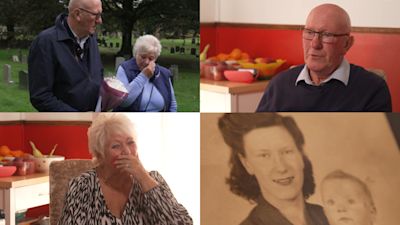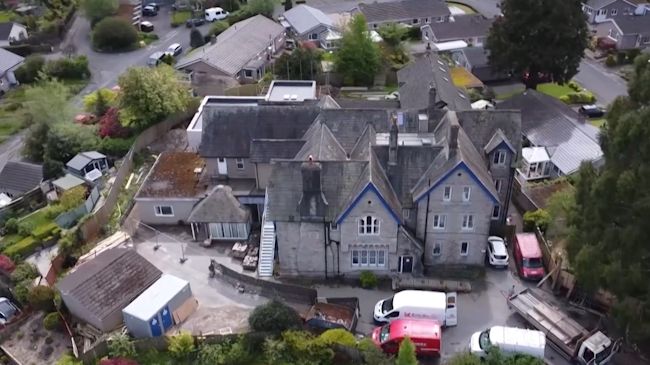‘They just took the baby away’: Family speaks out in church-run homes scandal
‘They just took the baby away’: Family speaks out in church-run homes scandal
- Wednesday 16 October 2024 at 10:27pm


A family has come forward following an ITV News investigation into cruelty and abuse at ex church run mother and baby homes, Social Affairs Correspondent Sarah Corker reports
Further allegations of abuse and neglect at a former church-run mother and baby home in Cumbria have emerged, following an ITV News investigation. Earlier this year we revealed that 45 babies who had died at St Monica’s home – in Kendal were buried in an unmarked grave in the town’s cemetery.
St Monica’s was one of hundreds of homes for unmarried mothers across England.
Between 1949 and the mid-1970s, an estimated 200,000 women were sent away to homes run by churches and the state where they were pressured and coerced in to give up their babies for adoption. Other infants died through poor care.
Since our first report aired in July, the family of one of those children has come forward and told ITV News that their mother was lied to about the fate of her baby daughter, Faith, and was never told where she was buried.
Norah Everard was in her 80s, and dying from cancer, when she told her family for the first time about the trauma she’d endured decades earlier as a teenager in 1941.
Pregnant and unmarried, she was sent away to St Monica’s, which was run by the Diocese of Carlisle, to have her baby.
Norah’s son Bob Chubb recounted the details that his late mother shared with him and his wife Carole about the “cruel” home.

“We were all round the table one Christmas, and she said ‘I’ve got something important to tell you both. Bob you weren’t my first born’, and then she told me about being raped as a young school girl, going to St Monica’s in Kendal to have the baby, and the baby was stillborn, called Faith,” Bob told ITV News.
Burial records seen by ITV News suggest that Norah was lied to, they show that Faith wasn’t stillborn and that she had lived for 12 hours and was later buried in an unmarked grave at Parkside Cemetery in Kendal – one of the 45 babies who were buried in secrecy.
If you’d like to share your story please get in touch with Sarah on the following email: Investigations@itv.com
“I don’t think she was told the truth. I think some terrible things went on,” Mr Chubb said. Carole Chubb, Bob’s wife, said: “It really really disgusts me. They just took the baby away and said the baby’s dead and that’s it. Did they even given her any milk? Would she have survived? “Norah told me it was cruel place, they made the women scrub floors when they were heavily pregnant and they were refused pain relief in labour as a punishment.”
Bob and Carole share their family’s story and concerns about how babies were treated
Concerns have been raised by other families about the poor care of sick and premature babies at the home in the decades after the war, while official documents from the archives paint a disturbing picture of neglect, cruelty and suffering inside St Monica’s. Bob revealed that he too was born prematurely at the same home in the late 1940s, and feels ‘lucky’ that he survived.
The acting Bishop of Carlisle Rt Rev Rob Saner-Haigh described what had happened to Norah and her daughter as ‘wrong’ and said he was ‘really sorry’ for the way women and children had been treated.
The acting Bishop of Carlisle Rt Rev Rob Saner-Haigh answers questions from ITV News
Since allegations of abuse first emerged, 20 people with a connection to St Monica’s have contacted the Diocese requesting access to their family records. “The Church of England should do all it can to support people who have lived with the trauma. We need to listen and give them a choice in decision making so they can tell us what they need and as an organisation we show them the love and dignity that they weren’t shown before,” he said.
The family of another baby, Stephen Holt, who died aged 3 months old at the home in 1964, are now campaigning for a permanent memorial to the 45 babies.
It was years later when baby Stephen’s mother Judith Hindley first told her husband, also called Stephen, of the abuse she endured at the ‘draconian’ home in the late 1960s. “Judith was 17 at the time and told me how she was forced to clean floors and kitchens while heavily pregnant. They were being punished,” he said. “Her son Stephen was born with disabilities and needed to go to hospital, but he was cruelly denied proper medical care and died 11 weeks later.” She never recovered from that trauma and in 2006, Judith took her own life close to the cemetery where her baby is buried.
Stephen Hindley explains what happened to his wife Judith at St Monica’s and why he is campaigning for a memorial
Cumbria Police has confirmed it is still investigating allegations of historic abuse at St Monica’s and said it “would welcome any new information which would assist officers…following concerns raised in relation to these premises”. Westmorland and Furness District Council which owns the cemetery where the graves are located said: “We are currently exploring options and reaching out to others who may wish to be involved or consulted on the possibility of marking the unmarked graves at Parkside Road cemetery, Kendal relating to the former St Monica’s Maternity home.”
Department for Education spokesperson said: “We have the deepest sympathy with all of those who are affected, the practice was abhorrent and should never have taken place.
“While we will not be able to quickly make every change we would like, we will look at whether there is any more we could do to support those affected.”
Leave a Reply